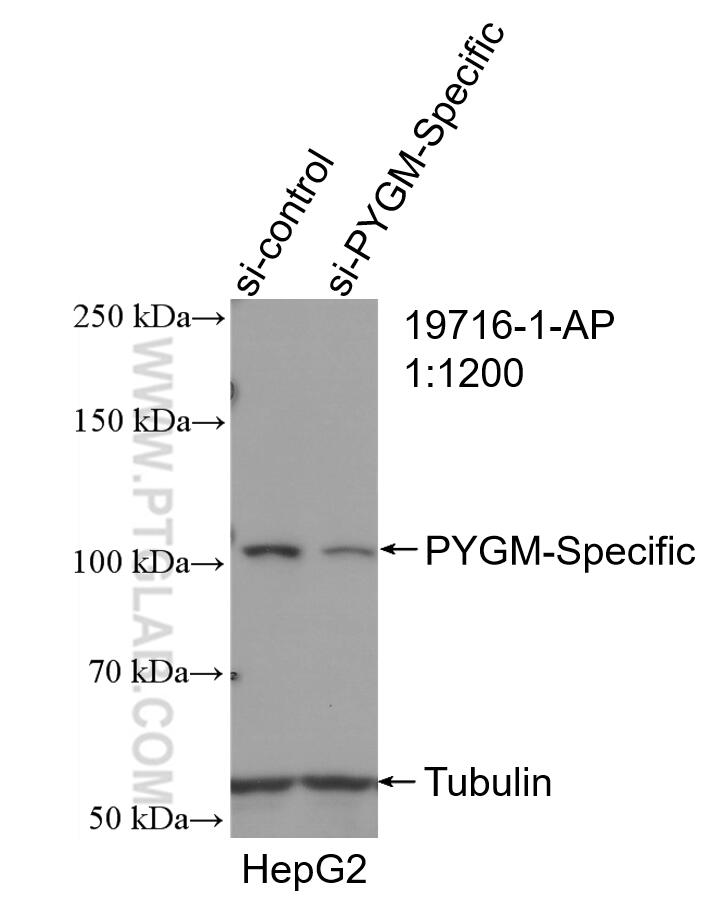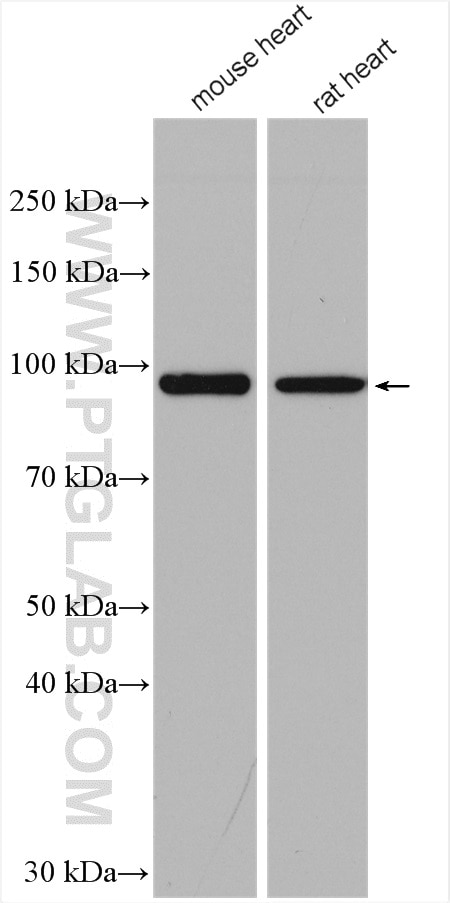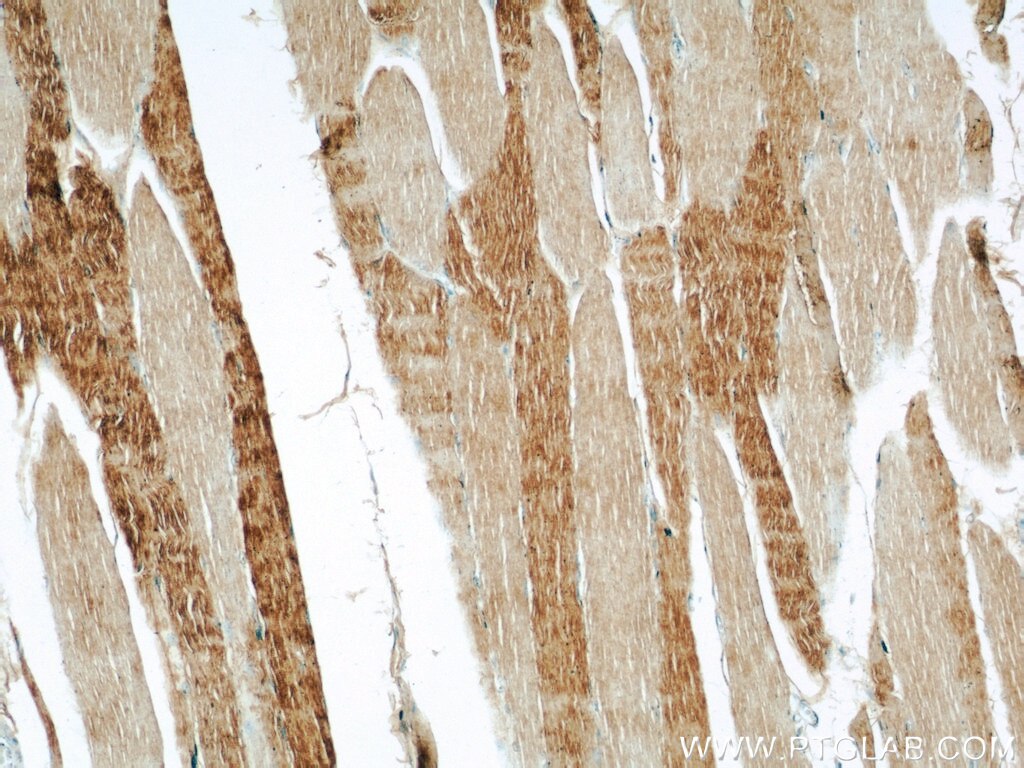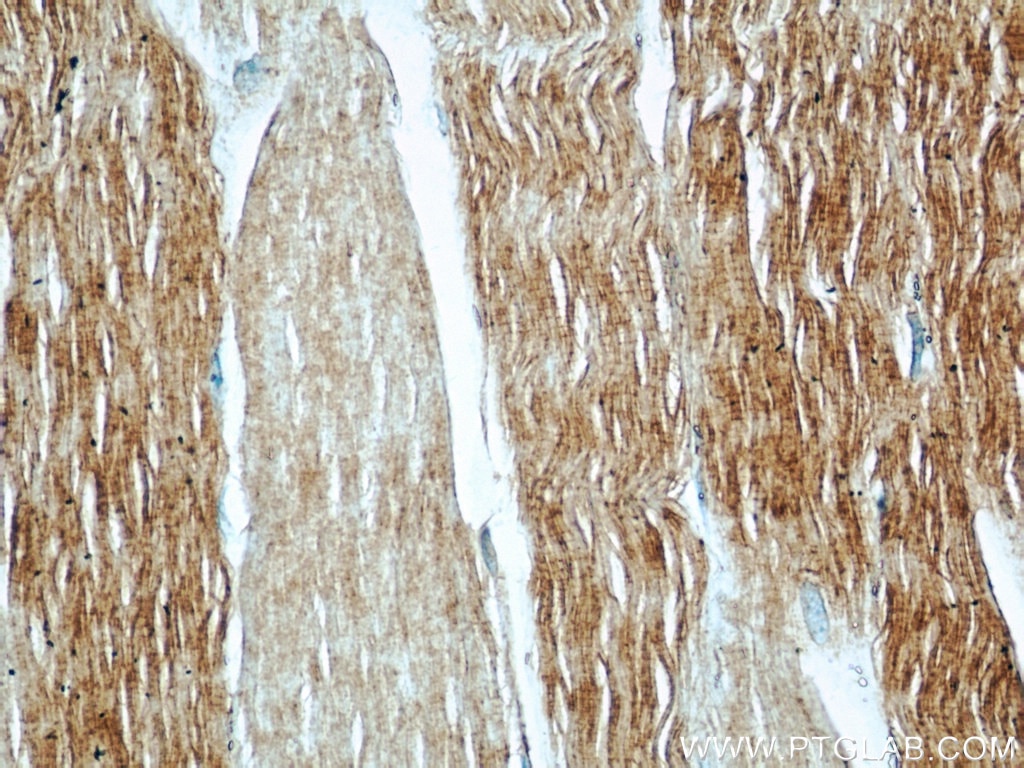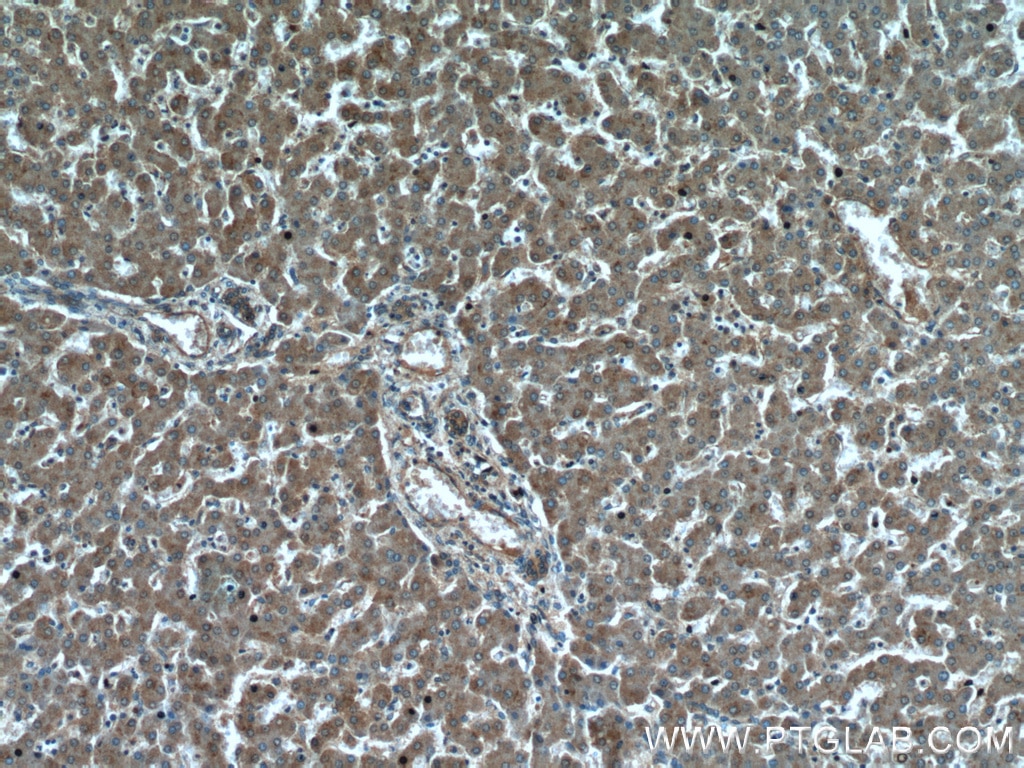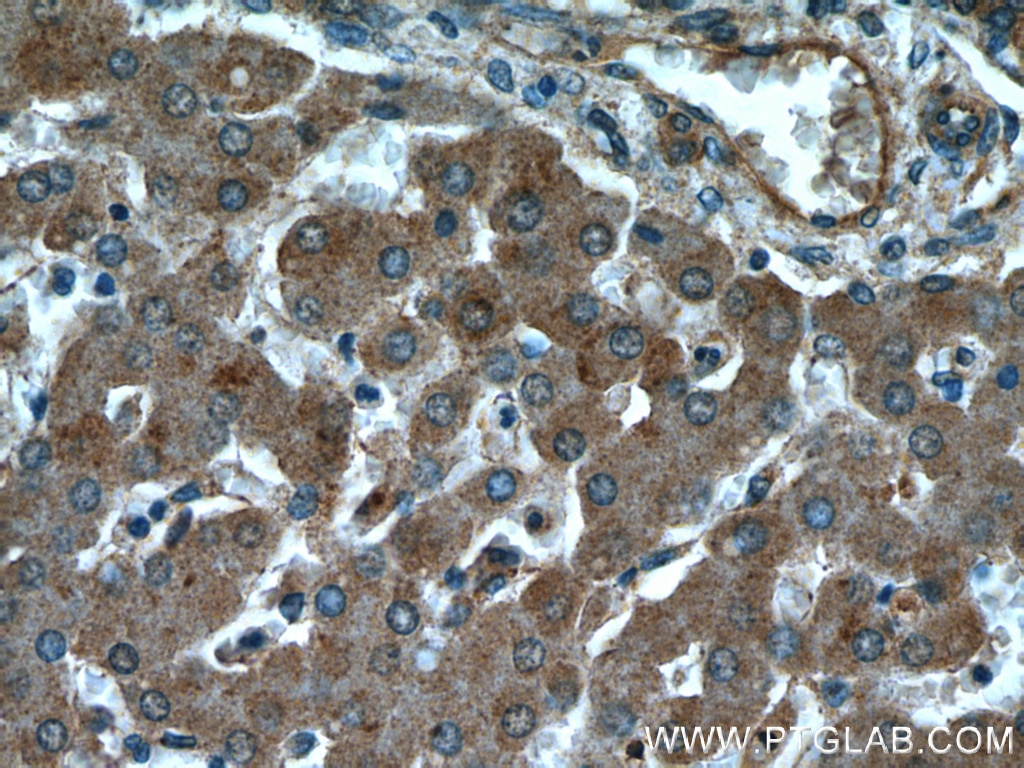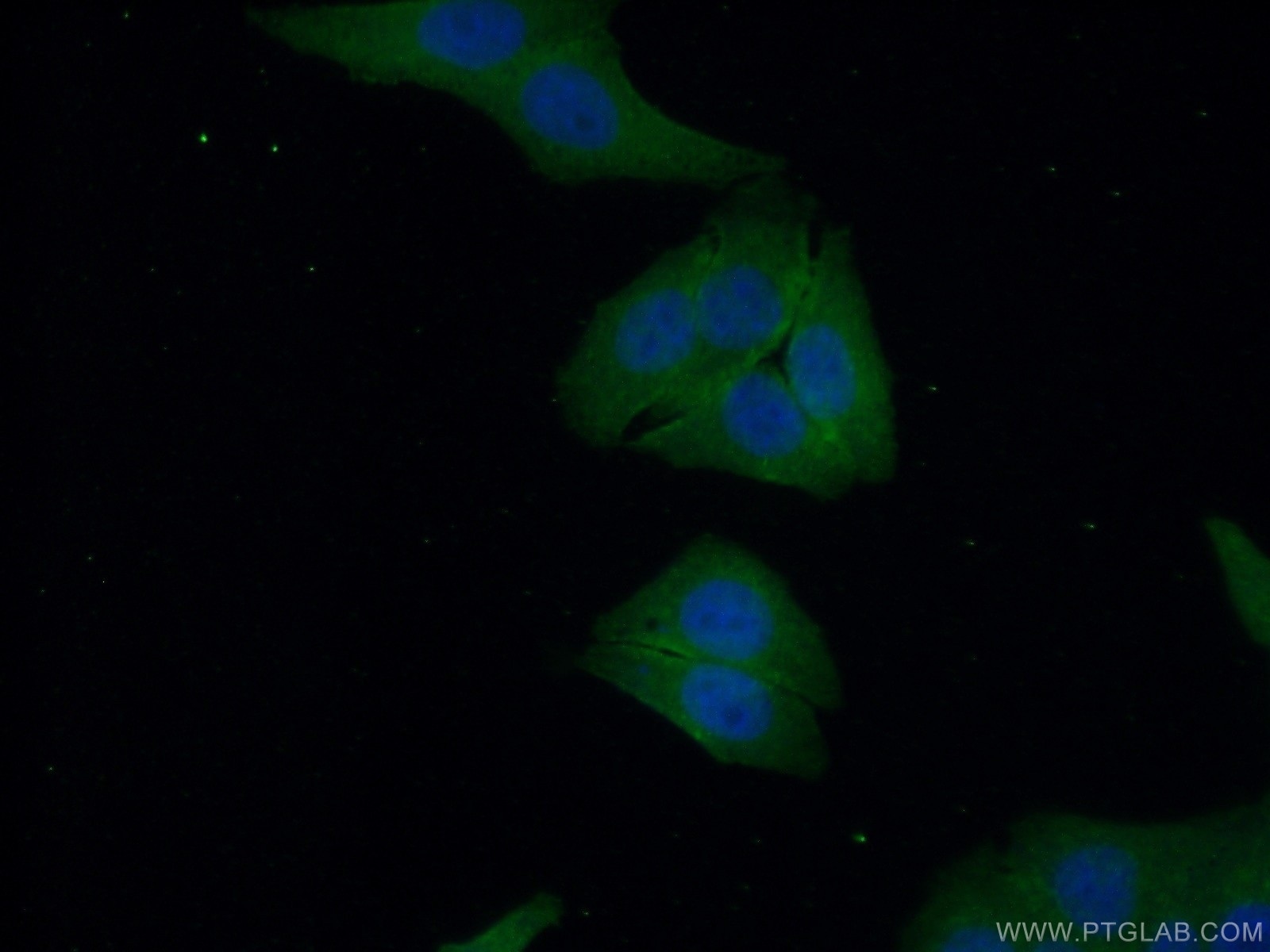- Phare
- Validé par KD/KO
Anticorps Polyclonal de lapin anti-PYGM-Specific
PYGM-Specific Polyclonal Antibody for WB, IF, IHC, ELISA
Hôte / Isotype
Lapin / IgG
Réactivité testée
Humain, rat, souris
Applications
WB, IHC, IF/ICC, ELISA
Conjugaison
Non conjugué
N° de cat : 19716-1-AP
Synonymes
Galerie de données de validation
Applications testées
| Résultats positifs en WB | tissu cardiaque de souris, cœur de rat |
| Résultats positifs en IHC | tissu de muscle squelettique humain, tissu hépatique humain il est suggéré de démasquer l'antigène avec un tampon de TE buffer pH 9.0; (*) À défaut, 'le démasquage de l'antigène peut être 'effectué avec un tampon citrate pH 6,0. |
| Résultats positifs en IF/ICC | cellules HepG2 |
Dilution recommandée
| Application | Dilution |
|---|---|
| Western Blot (WB) | WB : 1:2000-1:10000 |
| Immunohistochimie (IHC) | IHC : 1:20-1:200 |
| Immunofluorescence (IF)/ICC | IF/ICC : 1:20-1:200 |
| It is recommended that this reagent should be titrated in each testing system to obtain optimal results. | |
| Sample-dependent, check data in validation data gallery | |
Applications publiées
| WB | See 7 publications below |
| IHC | See 1 publications below |
Informations sur le produit
19716-1-AP cible PYGM-Specific dans les applications de WB, IHC, IF/ICC, ELISA et montre une réactivité avec des échantillons Humain, rat, souris
| Réactivité | Humain, rat, souris |
| Réactivité citée | Humain, souris |
| Hôte / Isotype | Lapin / IgG |
| Clonalité | Polyclonal |
| Type | Anticorps |
| Immunogène | Peptide |
| Nom complet | phosphorylase, glycogen, muscle |
| Masse moléculaire calculée | 97 kDa |
| Poids moléculaire observé | 97-105 kDa |
| Numéro d’acquisition GenBank | NM_005609 |
| Symbole du gène | PYGM |
| Identification du gène (NCBI) | 5837 |
| Conjugaison | Non conjugué |
| Forme | Liquide |
| Méthode de purification | Purification par affinité contre l'antigène |
| Tampon de stockage | PBS avec azoture de sodium à 0,02 % et glycérol à 50 % pH 7,3 |
| Conditions de stockage | Stocker à -20°C. Stable pendant un an après l'expédition. L'aliquotage n'est pas nécessaire pour le stockage à -20oC Les 20ul contiennent 0,1% de BSA. |
Informations générales
PYGM belongs to the glycogen phosphorylase family. Phosphorylase is an important allosteric enzyme in carbohydrate metabolism. Enzymes from different sources differ in their regulatory mechanisms and in their natural substrates. However, all known phosphorylases share catalytic and structural properties. Defects in PYGM are the cause of glycogen storage disease type 5 (GSD5) which also known as McArdle disease. The antibody is specific to PYGM.
Protocole
| Product Specific Protocols | |
|---|---|
| WB protocol for PYGM-Specific antibody 19716-1-AP | Download protocol |
| IHC protocol for PYGM-Specific antibody 19716-1-AP | Download protocol |
| IF protocol for PYGM-Specific antibody 19716-1-AP | Download protocol |
| Standard Protocols | |
|---|---|
| Click here to view our Standard Protocols |
Publications
| Species | Application | Title |
|---|---|---|
Int J Biol Sci PYGL-mediated glucose metabolism reprogramming promotes EMT phenotype and metastasis of pancreatic cancer | ||
Cells Proteomic Landscape and Deduced Functions of the Cardiac 14-3-3 Protein Interactome | ||
Oncol Lett Analysis of the expression, function and signaling of glycogen phosphorylase isoforms in hepatocellular carcinoma. | ||
Clin Proteomics The different expression of glycogen phosphorylases in renal clear cell renal carcinoma and chromophobe renal carcinoma |
Avis
The reviews below have been submitted by verified Proteintech customers who received an incentive forproviding their feedback.
FH Patricia (Verified Customer) (02-25-2020) | Some non-specific bands appeared. Blocked in 5% skim milk and diluted antibody in TBS.
|
